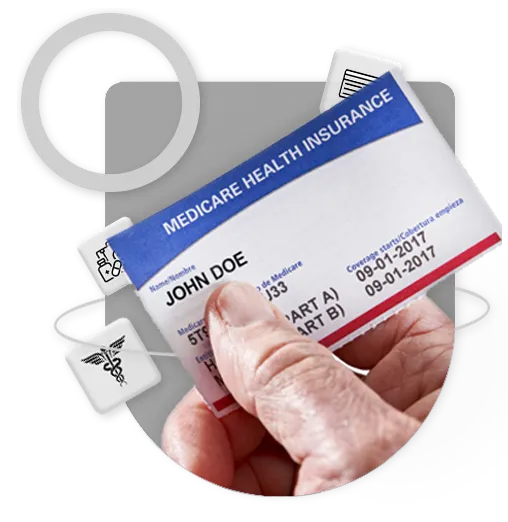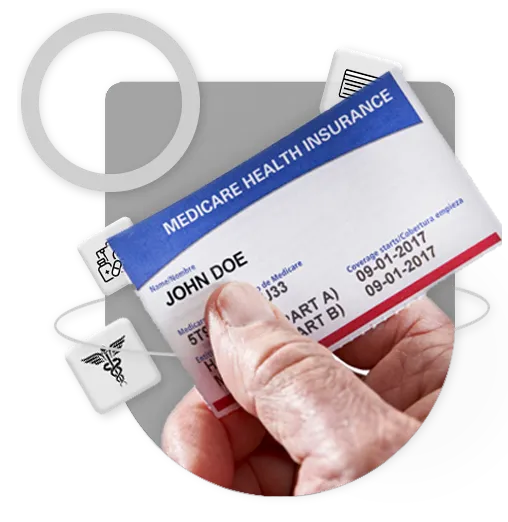

What is Medicare?
Medicare is a federal health insurance program accessible to individuals who are 65 years and older, as well as to those under 65 with specific disabilities or medical conditions like End-Stage Renal Disease.
It comprises various components, known as Parts A, B, C, and D, each designed to meet different healthcare requirements.

What is Medicare?

Medicare is a federal health insurance program accessible to individuals who are 65 years and older, as well as to those under 65 with specific disabilities or medical conditions like End-Stage Renal Disease.
It comprises various components, known as Parts A, B, C, and D, each designed to meet different healthcare requirements.

Original Medicare
Medicare Parts A and B are referred to as "Original Medicare".
These parts are managed by the federal government. Some individuals who receive Social Security benefits are automatically enrolled in Original Medicare while others need to apply for it as they approach their 65th birthday.

Original Medicare
Medicare Parts A and B are referred to as "Original Medicare".
These parts are managed by the federal government. Some individuals who receive Social Security benefits are automatically enrolled in Original Medicare while others need to apply for it as they approach their 65th birthday.
Medicare Part A (Hospital Insurance)
Medicare Part A includes coverage for inpatient services in hospitals or skilled nursing facilities, as well as home health care and hospice care for patients with terminal illnesses.
Part A Cost
Deductible
You must first meet a Part A deductible before Part A helps with your covered medical expenses.
Options
There is no insurance premium for Part A if you or your spouse have paid into Social Security for a minimum of 10 years.
If not, you have the option to purchase Medicare Part A.
Copays
Copayments or cost-sharing might be required for certain services. This includes prolonged hospital or skilled nursing facility stays.
Coinsurance
Part A has coinsurance for:
• Inpatient hospital care lasting between 61-90 days total per benefit period.
• Inpatient mental health care lasting between 61-90 days total per benefit period.
• Skilled nursing care lasting between 21-100 days total per benefit period.
Coinsurance is also available for a limited number of additional days.
Medicare Part A (Hospital Insurance)
Medicare Part A includes coverage for inpatient services in hospitals or skilled nursing facilities, as well as home health care and hospice care for patients with terminal illnesses.
Part A Cost
Deductible
You must first meet a Part A deductible before Part A helps with your covered medical expenses.
Options
There is no insurance premium for Part A if you or your spouse have paid into Social Security for a minimum of 10 years.
If not, you have the option to purchase Medicare Part A.
Copays
Copayments or cost-sharing might be required for certain services. This includes prolonged hospital or skilled nursing facility stays.
Coinsurance
Part A has coinsurance for:
• Inpatient hospital care lasting between 61-90 days total per benefit period.
• Inpatient mental health care lasting between 61-90 days total per benefit period.
• Skilled nursing care lasting between 21-100 days total per benefit period.
Coinsurance is also available for a limited number of additional days.
Medicare Part A:
Additional Information
You can utilize your coverage anywhere in the United States, as most hospitals in the country participate in Medicare.
Medicare Part B (Medical Insurance)
Medicare Part B provides coverage for doctor visits, durable medical equipment, speech therapy, occupational therapy, physical therapy, and various other outpatient services.
Part B Cost
Deductible
Similar to Part A, you must first meet an insurance deductible before Part B helps with your medical costs.
Copays
Copayments or cost-sharing might be required for certain services, such as those provided in an outpatient hospital setting
.
Coinsurance
You are responsible for 20 percent of the cost for certain medical services, including doctor visits, outpatient therapy, and durable medical equipment.
Preventative Care
Medicare-covered preventive care services, including annual wellness visits and mammograms for women, are fully covered. No deductibles, copayments, or coinsurance are required for these services.
Premium
Medicare Part B requires a monthly insurance premium, which depends on your enrollment timing and annual household income.This premium is typically deducted from Social Security benefits.
It is distinct from the premiums for Medigap, Medicare Advantage (Part C), or Prescription Drug Coverage (Part D).
Note about Medicare Part B Limits: Medicare Part B imposes annual limits on services for physical
therapy, occupational therapy, and speech-language pathology.
Medicare Part B (Medical Insurance)
Medicare Part B provides coverage for doctor visits, durable medical equipment, speech therapy, occupational therapy, physical therapy, and various other outpatient services.
Part B Cost
Deductible
Similar to Part A, you must first meet an insurance deductible before Part B helps with your medical costs.
Copays
Copayments or cost-sharing might be required for certain services, such as those provided in an outpatient hospital setting.
Coinsurance
You are responsible for 20 percent of the cost for certain medical services, including doctor visits, outpatient therapy, and durable medical equipment.
Preventative Care
Medicare-covered preventive care services, including annual wellness visits and mammograms for women, are fully covered. No deductibles, copayments, or coinsurance are required for these services.
Premium
Medicare Part B requires a monthly insurance premium, which depends on your enrollment timing and annual household income.This premium is typically deducted from Social Security benefits.
It is distinct from the premiums for Medigap, Medicare Advantage (Part C), or Prescription Drug Coverage (Part D).
Note about Medicare Part B Limits: Medicare Part B imposes annual limits on services for physical
therapy, occupational therapy, and speech-language pathology.
Medicare Part B:
Additional Information
If you have Original Medicare under Part B and your physician accepts Medicare, you can utilize your
coverage anywhere within the United States. You have the freedom to choose any doctor in the country who accepts Medicare patients. Additionally, Part B premiums, standard deductibles, and cost-sharing amounts typically undergo annual adjustments, with changes taking effect on January 1st.

Dalton Insurance Agency is committed to serving you at the highest level with all your Medicare needs.
National Producer Number: 20797672
DISCLAIMER: We do not offer every plan available in your area. Any information we provide is limited to those plans we do offer in your area. Please contact Medicare.gov or 1-800-MEDICARE to get information on all of your options.
Company
Directories
Legal